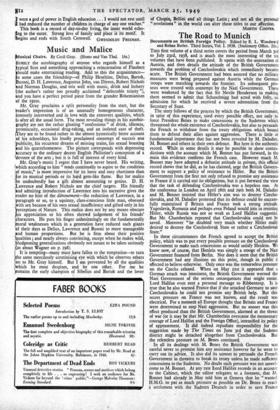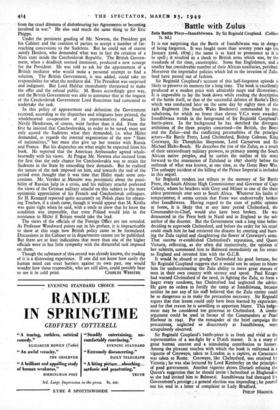The Road to Munich
Documents on British Foreign Policy. Edited by E. L. Woodward and Bohan Butler. Third Series, Vol. I. 1938. (Stationery Office. 21s.) THIS first volume of a third series covers the period from March 3rd to July 23rd, 1938, and is much the most interesting of the six volumes that have been published. It opens with the annexation of Austria, and then details the attitude of the British Government towards the problem of Czechoslovakia which immediately became acute. The British Government had been assured that no military measures were being prepared against Austria while the German troops were marching towards the frontier. Its subsequent pro- tests were treated with contempt by the Nazi Government. These were weakened by the fact that Sir Nevile Henderson in making them seemed to admit that Schuschnigg had acted with folly, an admission for which he received a severe admonition from the Secretary of State.
The story follows of the process by which the British Government, in spite of this experience, used every possible effort, not only to force President Benes to make concessions to the Sudetens which threatened the whole existence of Czechoslovakia, but also to persuade the French to withdraw from the treaty obligations which bound them to defend their allies against aggression. There is little of fundamental importance that has not been revealed by M. Daladier, M. Bonnet and others in their own defence. But here is the authentic record. While in some details it may be possible to show contra- dictions with the account which M. Bonnet has put forward, in the main this evidence confirms the French case. However much M. Bonnet may have adopted a defeatist attitude in private, this official record shows that he did, as he has claimed, urge the British Govern- ment to support a policy of resistance to Hitler. But the British Government from the first not only refused to promise any assistance to France if it carried out its obligations, but it put forward the view that the task of defending Czechoslovakia was a hopeless one. At the conference in London on April 28th and 29th both M. Daladier and M. Bonnet insisted that Hitler's aim was to destroy Czecho- slovakia, and M. Daladier protested that its defence could be success- fully maintained if Britain and France took a strong attitude. Yugoslavia, Rumania and perhaps even Poland would join in resisting Hitler, while Russia was not so weak as Lord Halifax suggested. But Mr. Chamberlain repeated that Czechoslovakia could not be saved. Moreover "he doubted very much whether Hitler really desired to destroy the Czechoslovak State or rather a Czechoslovak State."
In these circumstances the French agreed to accept the British policy, which was to put every possible pressure on the Czechoslovak Government to make such concessions as would satisfy Henlein. We know now, of course, that Henlein was simply a stooge of the Nazi Government financed from Berlin. Nor does it seem that the British Government had any illusions on this point, though in public it affected to believe otherwise. Only once was the remorseless pressure on the Czechs relaxed. When on May 21st it appeared that a German attack was imminent, the British Government warned the Nazi Government of the serious consequences that might ensue. Lord Halifax even sent a personal message to Ribbentrop. It is true that he also warned France that if she attacked Germany to save Czechoslovakia he could not promise any British help. But this secret pressure on France was not known, and the result was electrical. For a moment all Europe thought that Britain and France were determined to stop Nazi aggression. But no sooner was this effect produced than the British Government, alarmed at the threat of war (or it may be that Mr. Chamberlain overcame the momentary courage of Lord Halifax and the Foreign Office), intensified its policy of appeasement. It did indeed repudiate responsibility for the suggestion made by The Times on June 3rd that the Sudeten district might be detached altogether from Czechoslovakia. But the relentless pressure on M. Benes continued.
In all its dealings with M. Benes the British Government was careful never to promise him any assistance however far he went to carry out its advice. It also did its utmost to persuade the French Government to threaten to break its treaty unless he made sufficient concessions to the Sudetens. No doubt such pressure was not unwel- come to M. Bonnet. At any rate Lord Halifax records in an account to the Cabinet, which the editor relegates to a footnote, that M. Bonnet had already in May told him at Geneva that he " wanted H.M.G. to pat as much pressure as possible on Dr. Benes to reach a settlement with the Sudeten Deutsch in order to save France
from the cruel dilemma of dishonouring her Agreements or becoming involved in war." He also said much the same thing to Sir Eric Phipps.
Under the persistent goading of Mr. Newton, the President got his Cabinet and the coalition of parties to accept a number of far- reaching concessions to the Sudetens. But he could not of course satisfy Henlein, who demanded what was in fact the creation of a Nazi state inside the Czechoslovak Republic. The British Govern- ment, when a deadlock seemed imminent, produced a new scourge for the President. He was told to ask for the appointment of a British mediator who would make a personal attempt to find a solution. The British Government, it was added, could take no responsibility for what the mediator did. The President was surprised and indignant. But Lord Halifax immediately threatened to make the offer and the refusal public. M. Benes accordingly gave way, and the British Government was able to announce that at the request of the Czechoslovak Government Lord Runciman had consented to undertake the task.
In this policy of appeasement and defeatism the Government received, according to the dispatches and telegrams here printed, the wholehearted co-operation of its representatives abroad. Sir Nevile Henderson, of course, went further than it did. From the first he insisted that Czechoslovakia, in order to be saved, must not only accord the Sudetens what they demanded, i.e. what Hitler demanded, as regards the internal organisation of the new " State of nationalities," but must also give up her treaties. with Russia and France. But his dispatches are what might be expected from his book. He reported that the American Ambassador agreed whole- heartedly with his views. At Prague Mr. Newton also insisted from the first that the only chance for Czechoslovakia was to retain the Sudetens in the State by conceding their demands. But he realised the nature of the task imposed on him, and towards the end of the period even thought that it was time that Hitler made some con- cessions. Mr. Vereker at Moscow was pessimistic about the possi- bility of Russian help in a crisis, and his military attaché preferred the views of the German military attaché on this subject to the more optimistic appreciation of his French and Czechoslovak colleagues. Sir H. Kennard reported quite accurately on Polish plans for obtain- ing Teschen, if a crash came, though it would appear that M. Krofta was quite right when he said, with a smile to show that he knew the condition was impossible, that even Poland would join in the resistance to Hitler if Britain would take the lead.
The views of the officials of the Foreign Office are not revealed. As Professor Woodward points out in his preface, it is impracticable to show at this stage how British policy came to be formulated. Discussions in the Cabinet or in departments cannot yet be published. But there are at least indications that more than one of the higher officials were in but little sympathy with the distasteful task imposed on them.
Though the substance of this record was already known, the reading of it is a distressing experience. If one did not know how easily the human mind can erect barriers against its own past, one would wonder how those responsible, who are still alive, could possibly bear















































 Previous page
Previous page